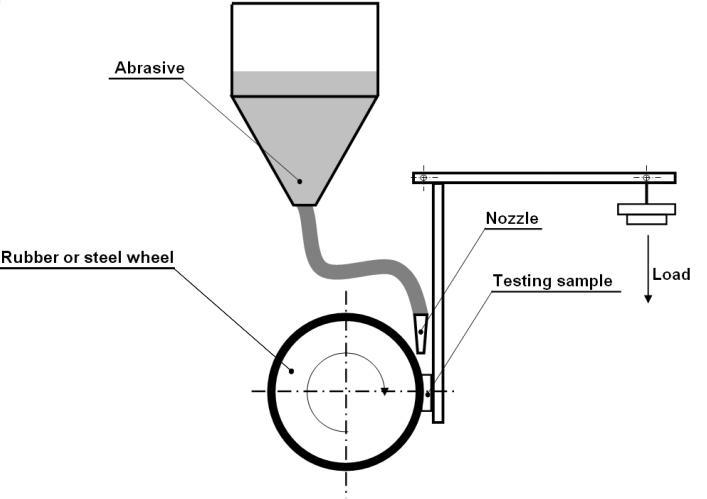MES provides abrasion, friction, & WEAR testing.
Abrasion testing
ASTM G65 Test Setup
Friction, abrasion, and wear resistance testing can provide valuable insight into material and coating performance when in contact with another material. Understanding these properties can help you predict the mechanical performance or lifetime of a material or coating.
The coefficient of friction (COF) is a value that shows the relationship between the force of friction between two objects and the normal reaction between the objects that are involved. The COF can be determined for static and dynamic values under wet and dry conditions.
Abrasion testing is used to test the abrasive resistance of metals, composites, ceramics, weld overlays, and thermal spray coatings. Abrasion testing can provide data on material resistance to scratching abrasion under laboratory controlled conditions.
MES provides the following standard tests for friction and wear analysis:
Coefficient of friction measurements (ASTM D1894) are conducted on a film or sheeting specimen when sliding over itself or over another substance to determine the resistive force. The coefficients of friction are related to the slip properties of materials. COF testing provides empirical data for specific material combinations and can typically be correlated real world performance of in-service equipment.
Taber abrasion testing (ASTM D4060) is performed by mounting a flat specimen, typically under 0.25” thickness, to a rotating platform that contacts standard abrasive wheels at fixed speed and pressure. The abrasive wheels provide contact wear to the specimen for the duration of the test, typically 1,000 to 10,000 cycles. Gravimetric analysis (change in specimen mass) is measured to determine a wear index, which can be used to compare material wear resistance.
Dry Sand / Rubber Wheel (ASTM G65) abrasion test simulates sliding abrasion conditions under moderate pressure, using dry sand metered between a rubber wheel and a block coupon of the material being evaluated. The test allows comparison of wear-resistant materials by their volume loss in cubic millimeters, with materials of higher wear resistance showing lower volume loss.
Block on ring abrasion testing (ASTM D2714 and ASTM G77) utilizes rotational abrasion to study metal to metal contact wear performance.The test is performed by loading a rectangular test sample against a rotating metal ring.The test evaluates the friction and wear characteristics of materials and various coatings and lubricants in varied test conditions. MES utilizes a Falex block-on-ring machine to control the load, speed, and environment of the test.


